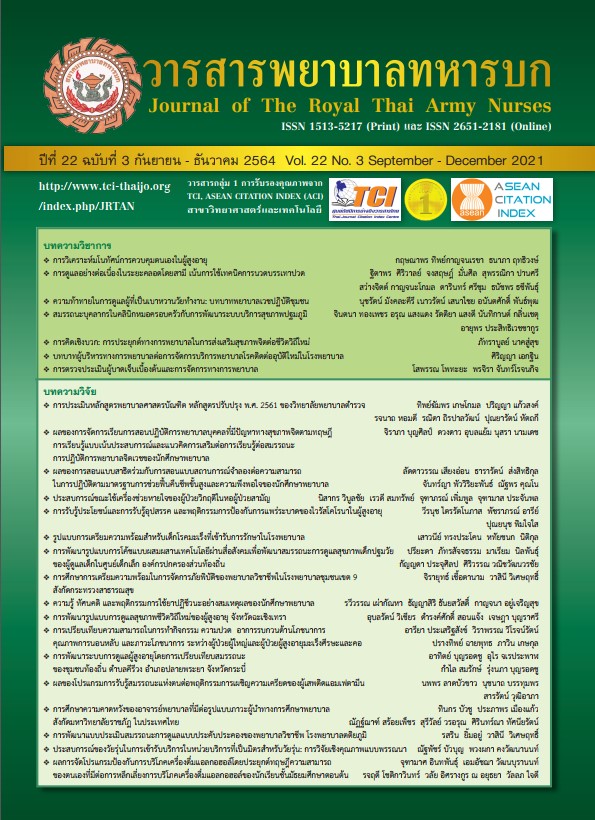Effects of The Brain Training Program on Cognitive Ability among Older person at Dementia Risk Group of the Elderly Home, Nakhon Ratchasima Provincial Administrative Organization
Keywords:
Brain-Training program, cognitive abilities, dementia, older person, elderly HomeAbstract
Dementia is a major public health problem among older person. Because of loss of their ability to think, make decisions, knowledge, memory, self-control, personality, mood, and behavioral changes. Affect to daily living and relationships with other people. As a result, their family and caregivers must have an increased burden. This study was an experimental research design that compare the cognitive abilities of an older person at risk of dementia between the experimental group receiving the brain training program developed from the theory of neurobic exercise and the control group receiving usual care. Results were measured with The Montreal Cognitive Assessment (MoCA) at the post-intervention, the 1-month and the 3- month follow-up period. Data analysis used descriptive statistics, Independent t-test and Repeated Measure Analysis of Variance statistics.
The results of the study showed that the intervention group had a higher overall score of cognitive ability than the control group across in all measurement time periods, at the post-intervention, the 1-month and the 3- month follow-up period were statistically significant differences to mean score pre-intervention (p <.05), especially mean score of the visuoconstruction, language, abstraction and delayed recall. Comparing the overall mean scores of the cognitive abilities showed that the mean difference in total score was statistically significant between the intervention and control groups (p <.05). In conclusion, the brain training program for the older person. This program can help slow down an occur dementia in older person.
Downloads
References
National Statistical Office. The 2014 survey of the older persons in Thailand. Text and Journal Publication. 2014;7-8. (in Thai)
Sutthilak C, Wirojratana V, Cheewakriengkrai L. Factors Predicting Health Status on Caregivers of Elderly People with Dementia. Journal of The Royal Thai Army Nurses 2018;19(1): 191-200. (in Thai)
Anothaisintawee T. Systematic review of dementia prevention in elderly. Thailand Development Research Institute. 2015;5-7. (in Thai)
Aekplakorn W. Report of Thai Population’s health by the physical examination 4th. Bangkok: Health Systems Research Institute; 2010. (in Thai)
Siritipakorn P. Nurses’s roles in caring for elderly people with dementia and the caregivers. Thai Journal of Nursing. 2014;63(4):12-9. (in Thai)
Undara W, Singhasenee U, Wongnitikul P. The study of dementia: Knowledge and prevention of dementia and the demographic data in the elderly association of royal Thai air force nursing college. Journal of the Police Nurses. 2016;8(1):23-33. (in Thai)
Chansirikarn S. Prolong brain age handbook. Bangkok: Rakluk group; 2008. (in Thai)
Linsakul W, Aiemkhum B. Cognitive Stimulation with Mild Cognitive Impairment in People. Region 11 Medical Journal. 2018;32(3): 1143-1154. (in Thai)
Boonkerd S, Rabampho P, Deenuanpanao S, Naksranoi S, Paikoh K. The Relationship between Social Support and Depression of The Elderly in The Elderly Home. Journal of The Royal Thai Army Nurses. 2018;19(1): 182-190. (in Thai)
Kriengkaisakda W, Chadcham S. Development of a Brain-Training Rehabilitation Program Based on Neurobics Exercise Theory for Patients with Mild Dementia. Research methodology & Cognitive science. 2012;10(1): 11-25. (in Thai)
Deborah E, Kristine Y. Computer-based cognitive training for mild cognitive impairment: results from a pilot randomized controlled trial. Alzheimer Dis Assoc Disord. 2009;23(3):205-10.
Julayanont P, Tangwongchai S, Hemrungrojn S, Tunvirachaisakul C, Phanthumchinda K, Hongsawat J. The Montreal Cognitive Assessment-Basic: A Screening Tool for Mild Cognitive Impairment in Illiterate and Low-Education Elderly Adults. J Am Geriatr Soc. 2015; 63:2550-4.
Chaiwong P. Effects of Cognitive Training Program on Cognitive Abilities and Quality of Life in Elderly with Suspected Dementia (Master thesis). Chiangmai: Chiangmai University; 2015. (in Thai).
Karuncharernpanit S. Older People with Dementia and Nursing Care: A Challenging Role for Nurses. Nursing Journal of The Ministry of Public Health. 2015;26(2):99-110. (in Thai)
Hongtong R, Sasat S, The effect of reminiscence program on cognitive function of older people with dementia. Journal of Nursing and Education. 2015;8(1):99-112. (in Thai )
Ross W P, Leonel T T, and Michael D G. Diagnosis and treatment of rapidly progressive dementias. Neurol Clin Pract. 2012;2(3): 187–200.
Assantachai P, Srisuwan P. Guideline to Taking care of the elderly at home (Chronic Disease and Geriatric Syndromes) Handbook. Nontaburi: Institute of Geriatric Medicine DMS MOPH Thailand; 2015. ISBN 978-974-442-76 (in Thai)
Wilson K Y. The effectiveness of memory training programs in improving the subjective memory characteristics of healthy older adults with memory complaints: A meta-analysis. Requirements for the Degree Doctorate in Psychology Marshall. West Virginia: University Huntington; 2005.
Chaiwong P, Rattakor P, Mumkhetvi P. Effects of cognitive training program on cognitive abilities and quality of life in elderly with suspected dementia. Chiang Mai Assoc Med Sci 2015;48(3):182-191 (in Thai)
Samael L, Thaniwattavanon P, Kong-in W. The Effect of Muslim-Specific Montessori-Based Brain-Training Program on Promoting Cognition in Muslim Elderly at Risk of Dementia. Princess of Naradhiwas University Journal. 2016; 8(2): 16-27. (in Thai)
Downloads
Published
How to Cite
Issue
Section
License
บทความหรือข้อคิดเห็นใดใดที่ปรากฏในวารสารพยาบาลทหารบกเป็นวรรณกรรมของผู้เขียน ซึ่งบรรณาธิการหรือสมาคมพยาบาลทหารบก ไม่จำเป็นต้องเห็นด้วย
บทความที่ได้รับการตีพิมพ์เป็นลิขสิทธิ์ของวารสารพยาบาลทหารบก
The ideas and opinions expressed in the Journal of The Royal Thai Army Nurses are those of the authors and not necessarily those
of the editor or Royal Thai Army Nurses Association.






